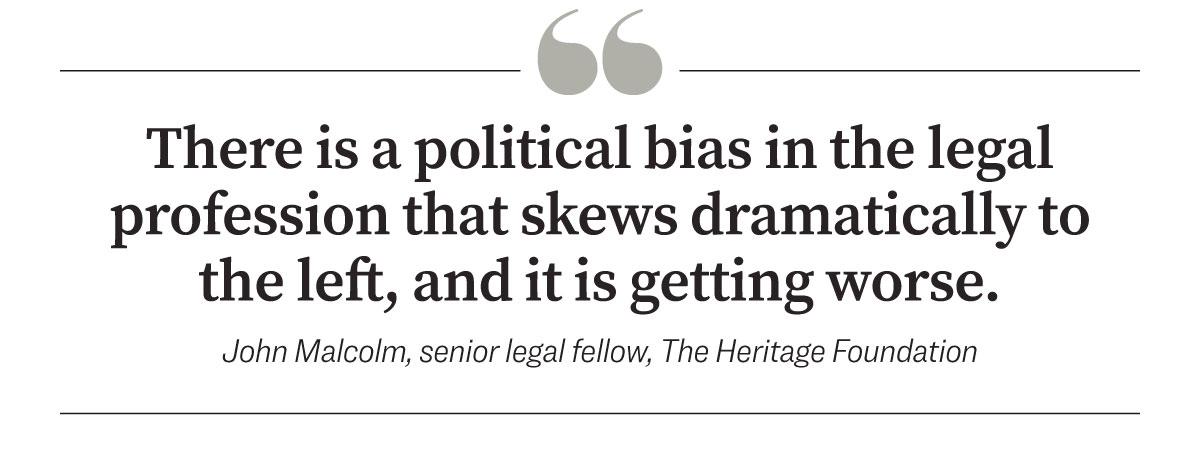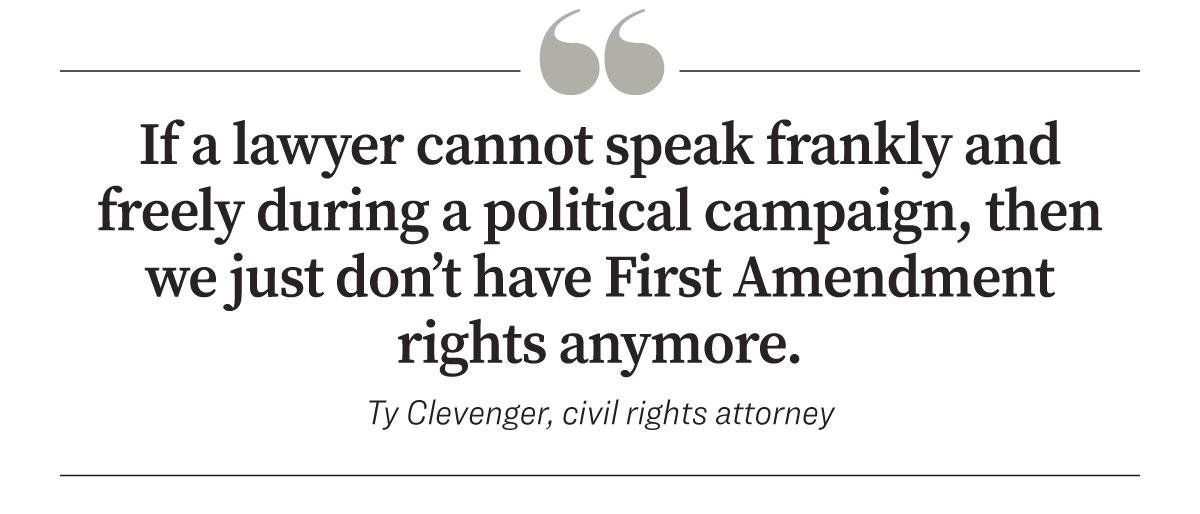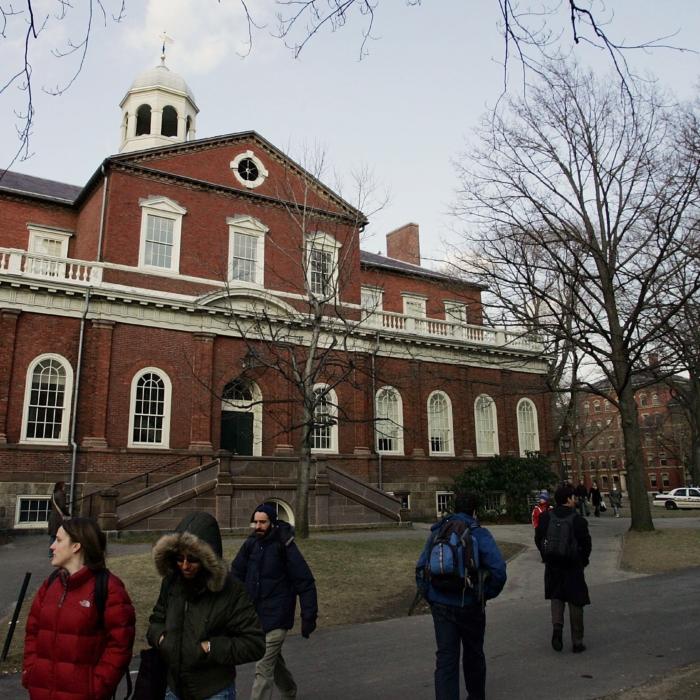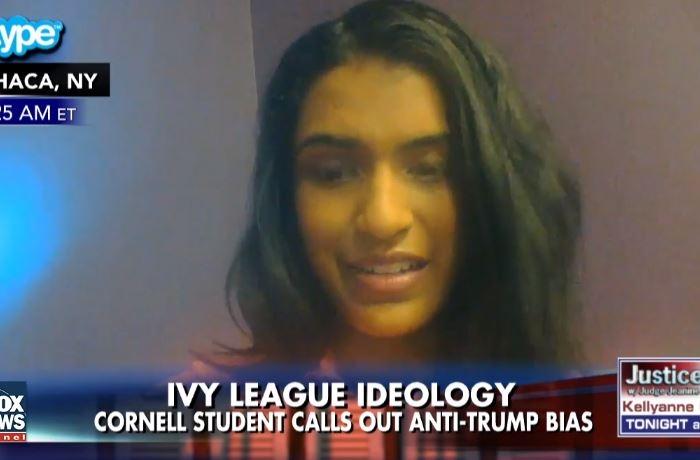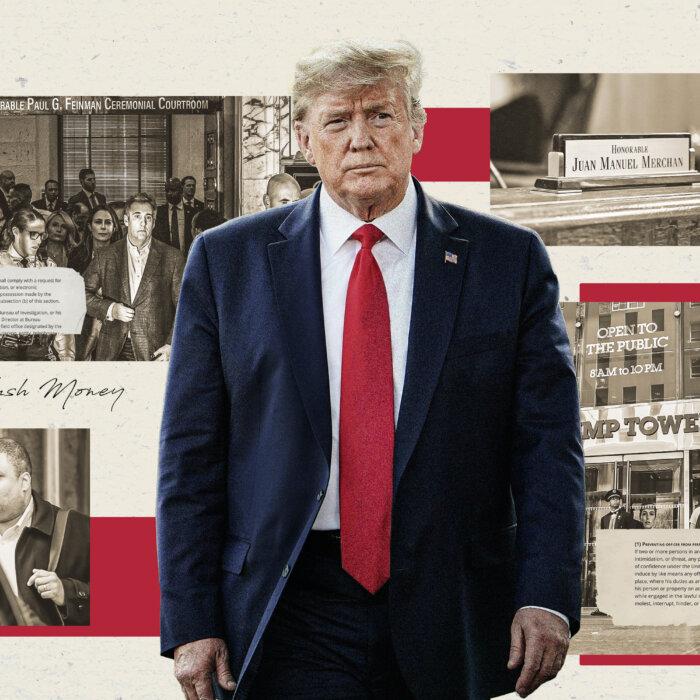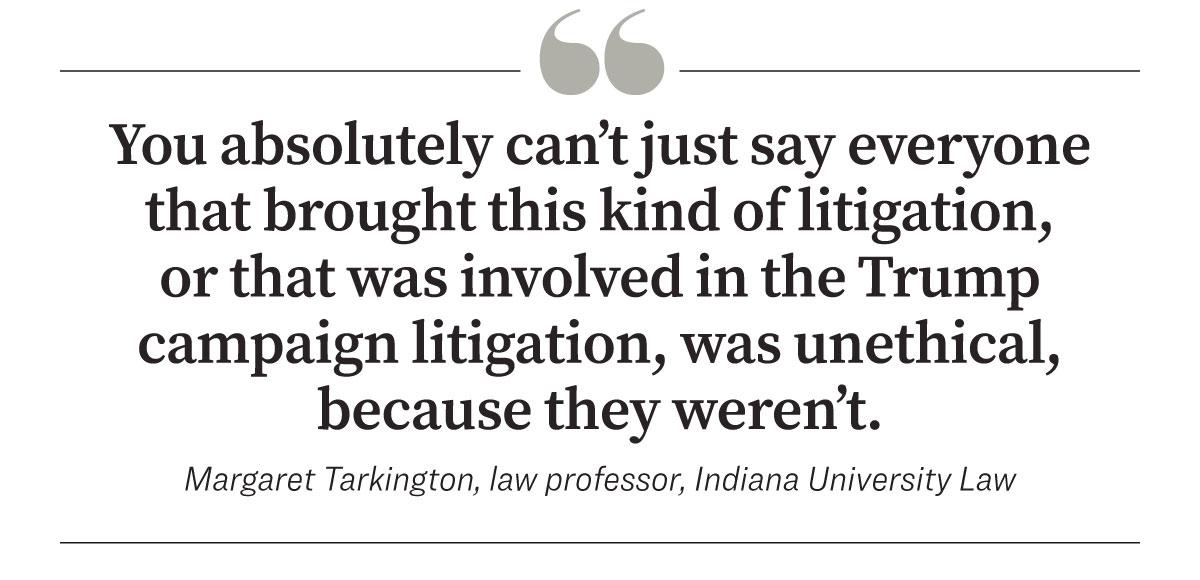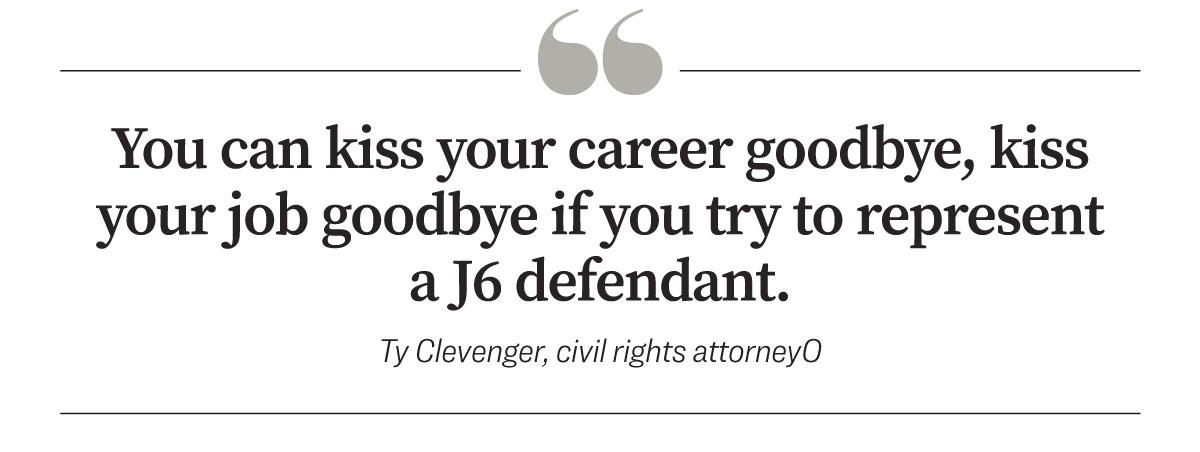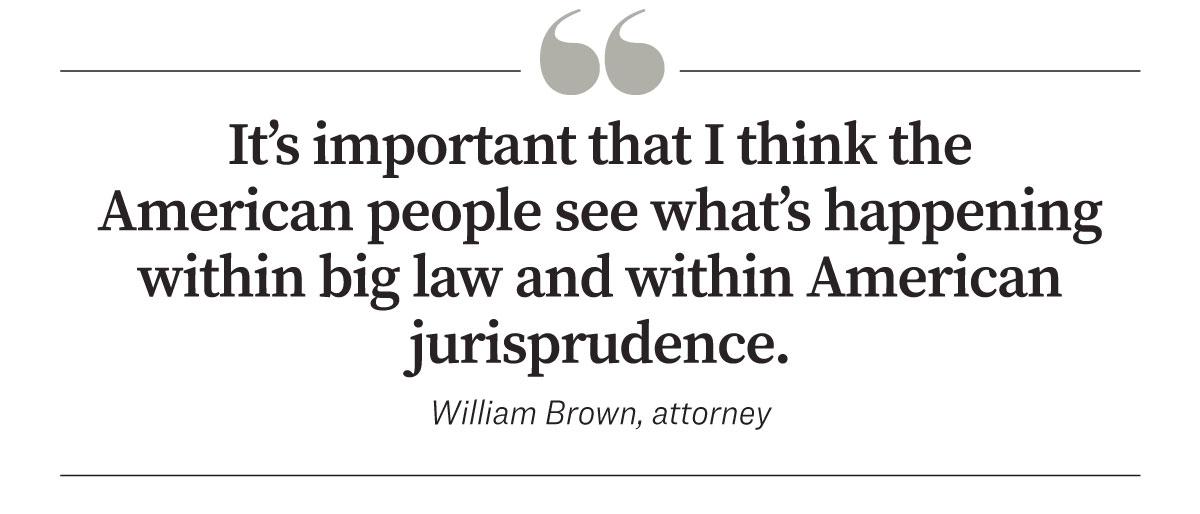A California bar court judge ruled in late March that John Eastman should be disbarred for helping President Donald Trump challenge the outcome of the 2020 election.
Before the California Supreme Court reviews the case, Mr. Eastman asked a judge to pause the order prohibiting him from practicing law, so he could fund his defense in the criminal case brought against President Trump and his attorneys in Georgia.
Jeffrey Clark, who also tried to help President Trump, is facing a similar disbarment hearing in Washington. The focal point is a “proof of concept” letter he drafted for President Trump in December 2020 that would have asked top Georgia officials to investigate alleged voter fraud in the state.
Mr. Clark and Mr. Eastman are the latest attorneys to face backlash from their profession over their actions. Former New York City Mayor Rudy Giulliani’s license was suspended in June 2021.
Sidney Powell, Kenneth Chesebro, and Jenna Ellis each have been sentenced in the Georgia case after making plea deals. Lawrence Joseph, Julia Haller, and Brandon Johnson, who worked on President Trump’s post election challenges in battleground states, are also facing disciplinary proceedings in Washington.
Other conservative attorneys have faced their own forms of professional repercussions and threats.
Christopher Crowley, a former prosecutor from Fort Myers, Florida, could be suspended by the Florida Bar after an ethics complaint was filed in 2020 for political statements he made about an opponent in a Republican primary for a state attorney election.
William Brown was fired from a prominent law firm in New Jersey for making political remarks about the glorification of violence in hip-hop and militant forms of Islam in a December 2023 LinkedIn post.
James Bopp Jr. was subject to an ethics complaint after he asked a judge to recuse himself while representing Michael Gableman in an investigation into Wisconsin’s election commission.
Patrick Leduc was harassed and criticized for representing one of the first defendants to go before a judge in the indictments related to the Jan. 6, 2021, Capitol breach.
And Timothy Parlatore faced public outcry for briefly representing President Trump in his Florida classified documents case and the one brought by DOJ Special Counsel Jack Smith in Washington, D.C.
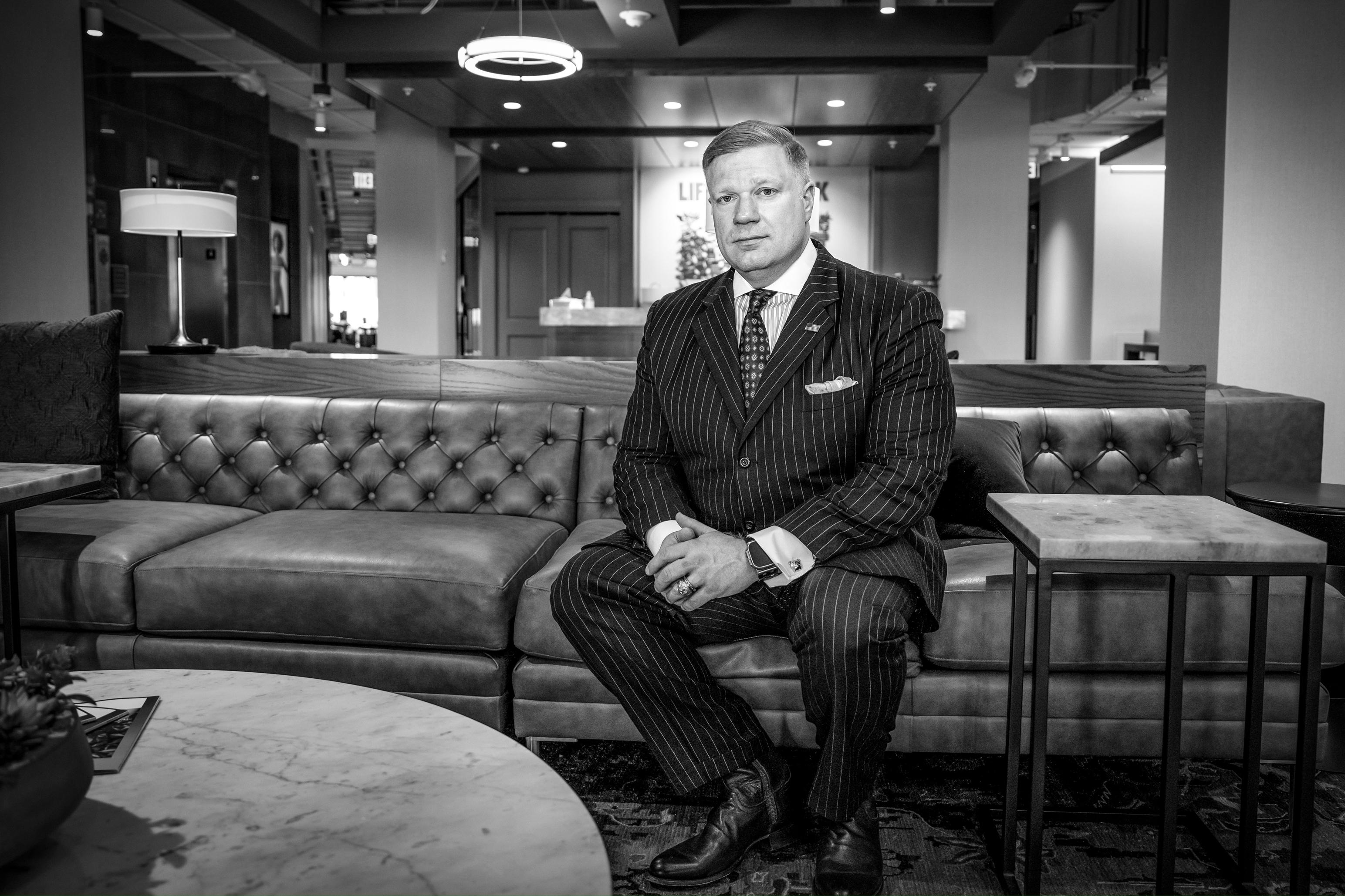
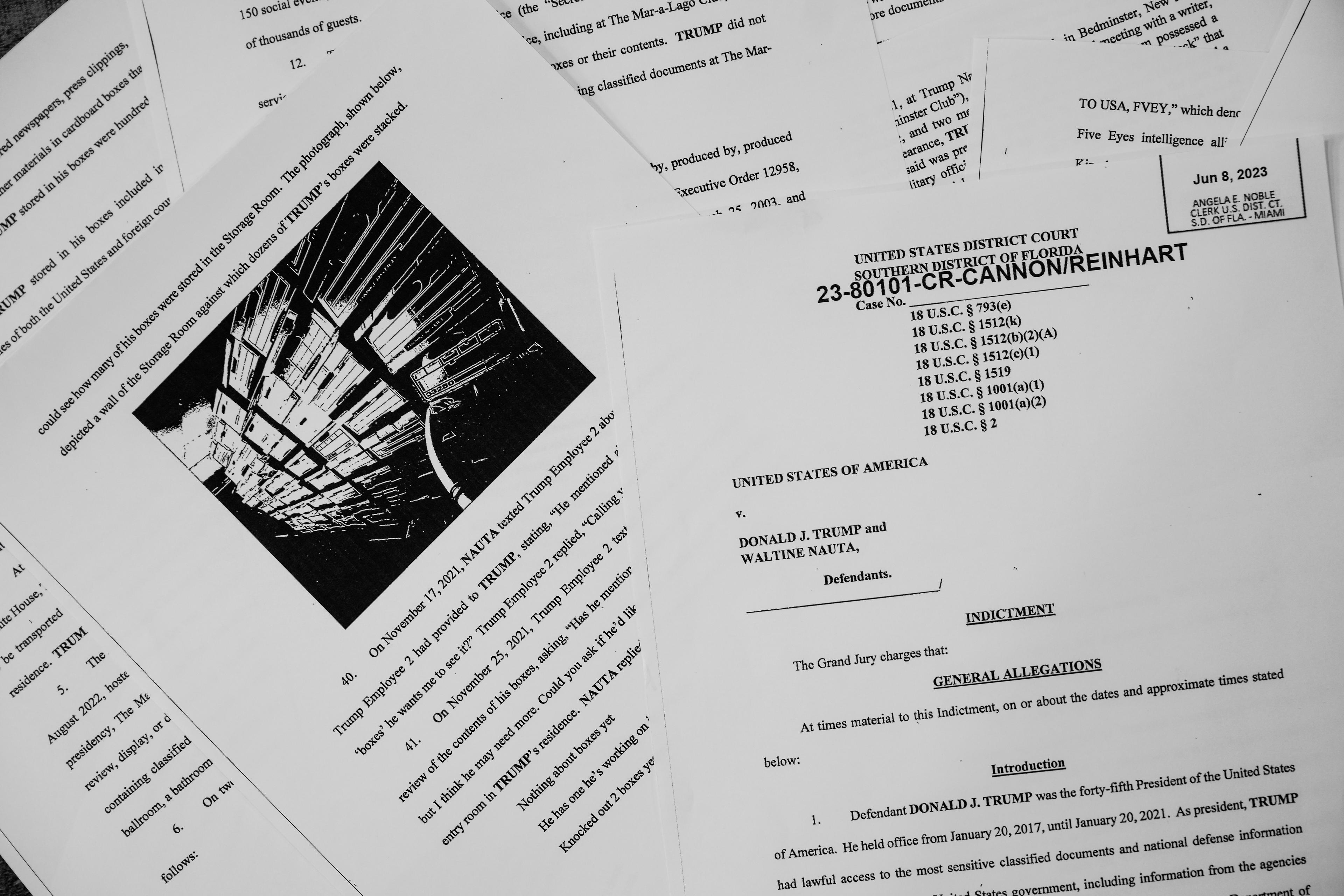
(Top) Timothy Parlatore, managing partner at Parlatore Law Group, in Arlington, Va., on Feb. 29, 2024. Mr. Parlatore faced public outcry for briefly representing President Trump in his Florida classified documents case and in the Jan. 6-related case filed in Washington. (Bottom) Former President Donald Trump’s indictment document on 37 felony counts in special counsel Jack Smith’s classified documents probe in Washington on June 9, 2023. (Madalina Vasiliu/The Epoch Times, Drew Angerer/Getty Images)
These attorneys have expressed to The Epoch Times a fear that legal proceedings and the legal profession as a whole are increasingly used to pursue lawyers on the right more than lawyers on the left.
Ty Clevenger, a civil rights attorney from Texas, said the alleged politicization of lawyer disciplinary actions sends the wrong signals.
“The message that’s going out to lawyers is that if you represent the wrong clients, you can pay for it personally. And so it’s not just lawyers who are being intimidated. It’s all the defendants or potential defendants out there who are going to have or are having more difficulty getting lawyers because lawyers don’t want to have to deal with repercussions,” he told The Epoch Times.
John Malcolm, a senior legal fellow with The Heritage Foundation, agrees.
“There is no question that there is a political bias in the legal profession that skews dramatically to the left, and it is getting worse,” he told The Epoch Times.
Free Speech and Bar Rules
Indiana University Law Professor Margaret Tarkington told The Epoch Times that two model rules from the American Bar Association (ABA) have the potential to disproportionately affect conservative attorneys.
Rule 8.2 says, “A lawyer shall not make a statement that the lawyer knows to be false or with reckless disregard as to its truth or falsity concerning the qualifications or integrity of a judge, adjudicatory officer or public legal officer, or of a candidate for election or appointment to judicial or legal office.”
While she believes the rule as it is written seemingly complies with the U.S. Constitution, “The way 8.2 is applied by most states in the United States is absolutely unconstitutional and violates lawyers’ first amendment rights,” Ms. Tarkington said.
She said the rule usually targets comments about judges, including judicial candidates, as a means of preserving the “perception of integrity” within the judiciary as a whole.
However, Ms. Tarkington believes it shields judges from “all effective criticism,” including from the very people who know what judges should and shouldn’t be doing: lawyers.
The Florida Bar’s version of this rule was applied to Mr. Crowley when he ran in 2018 for the state’s 20th Judicial Circuit State Attorney against Amira Fox.
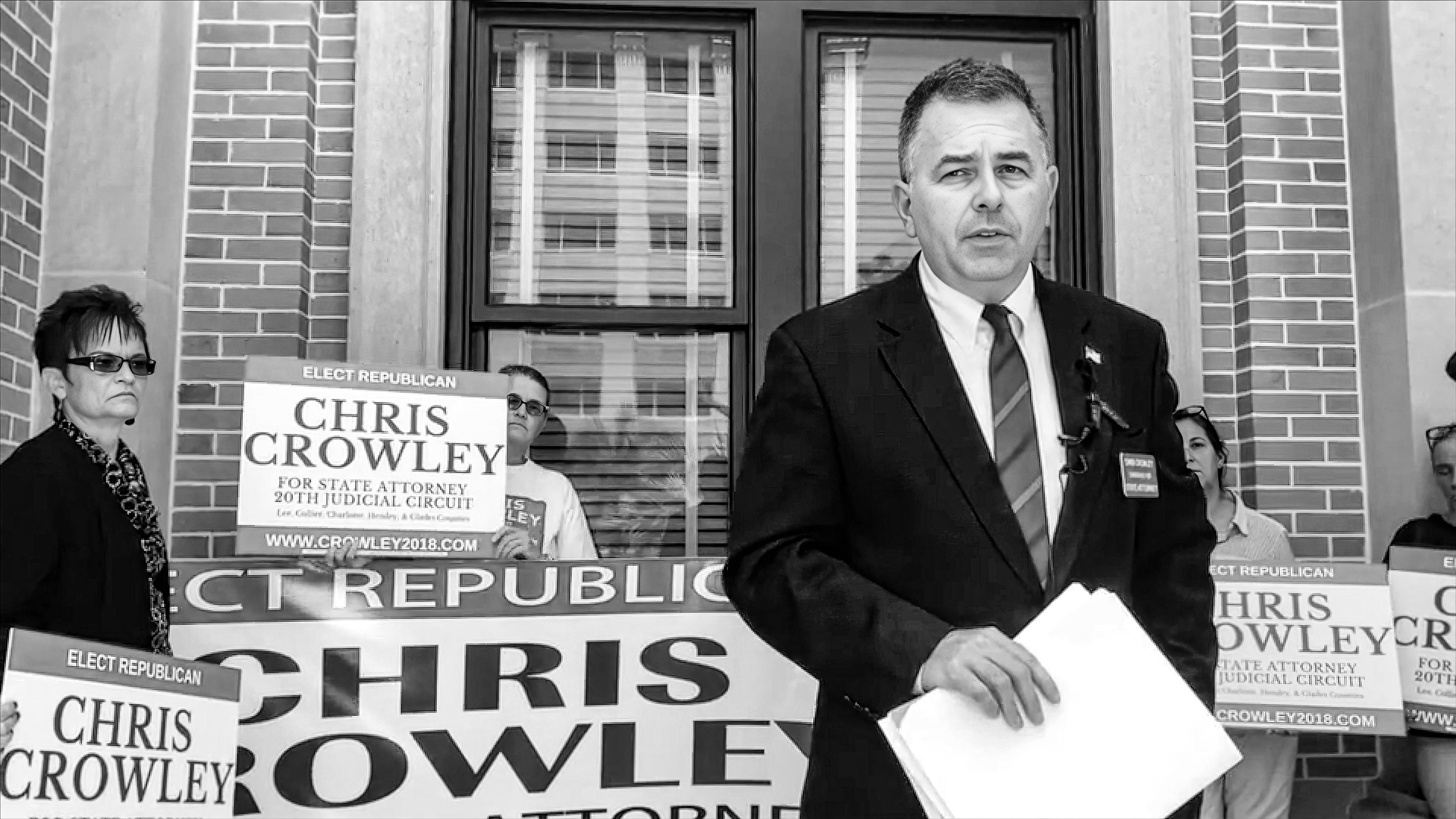
Attorney Christopher Crowley speaks at a media briefing at the Lee County Courthouse in Fort Myers, Fla. on Aug. 7, 2018. (Michael Braun/USA TODAY NETWORK)
The Florida Bar says he “publicly disparaged his opponent through various political campaign materials, advertisements, and social media postings” and violated other rules, including promoting an unlawful raffle lottery, which Mr. Crowley said was settled with a diversion agreement.
He criticized Ms. Fox’s conviction record, called her “corrupt” and “swampy,” and referenced her uncle’s association with the Palestine Liberation Organization (PLO). After he shared an article on Facebook that referred to Ms. Fox as a “Muslim candidate,” the Florida Bar says Mr. Crowley was attacking her religion.
However, Mr. Crowley says he never knew, nor cared, what religion Ms. Fox followed, if any, and was merely sharing an article that he didn’t author that discussed her family’s relationship with the PLO, which he sees as a terrorist group.
“So basically, and factually, the Florida Bar is regulating political speech,” Mr. Crowley told The Epoch Times.
He said that, in calling Ms. Fox “corrupt,” he cited “facts, figures, and news articles” and that “now the Florida Bar is saying I cannot do that.”
Ms. Tarkington said rule 8.2 is usually applied to judicial candidates and not state attorney races.
“That is an absolutely bizarre application of that. That is not commonly done,” she said of Mr. Crowley’s Florida Bar ethics complaint.
Mr. Clevenger also took issue with the way ABA rules were applied in Mr. Crowley’s ethics complaints.
“If a lawyer cannot speak frankly and freely during a political campaign, then we just don’t have First Amendment rights anymore,” he said.
The ABA creates rule guidelines for state bar associations throughout the country but does not directly “license or discipline lawyers,” an ABA spokesperson told The Epoch Times.
“Each state licenses lawyers and investigates complaints of ethical violations by lawyers licensed in their state. Usually, it’s the state supreme court or state bar—under the authority of the state supreme court—that does that.”
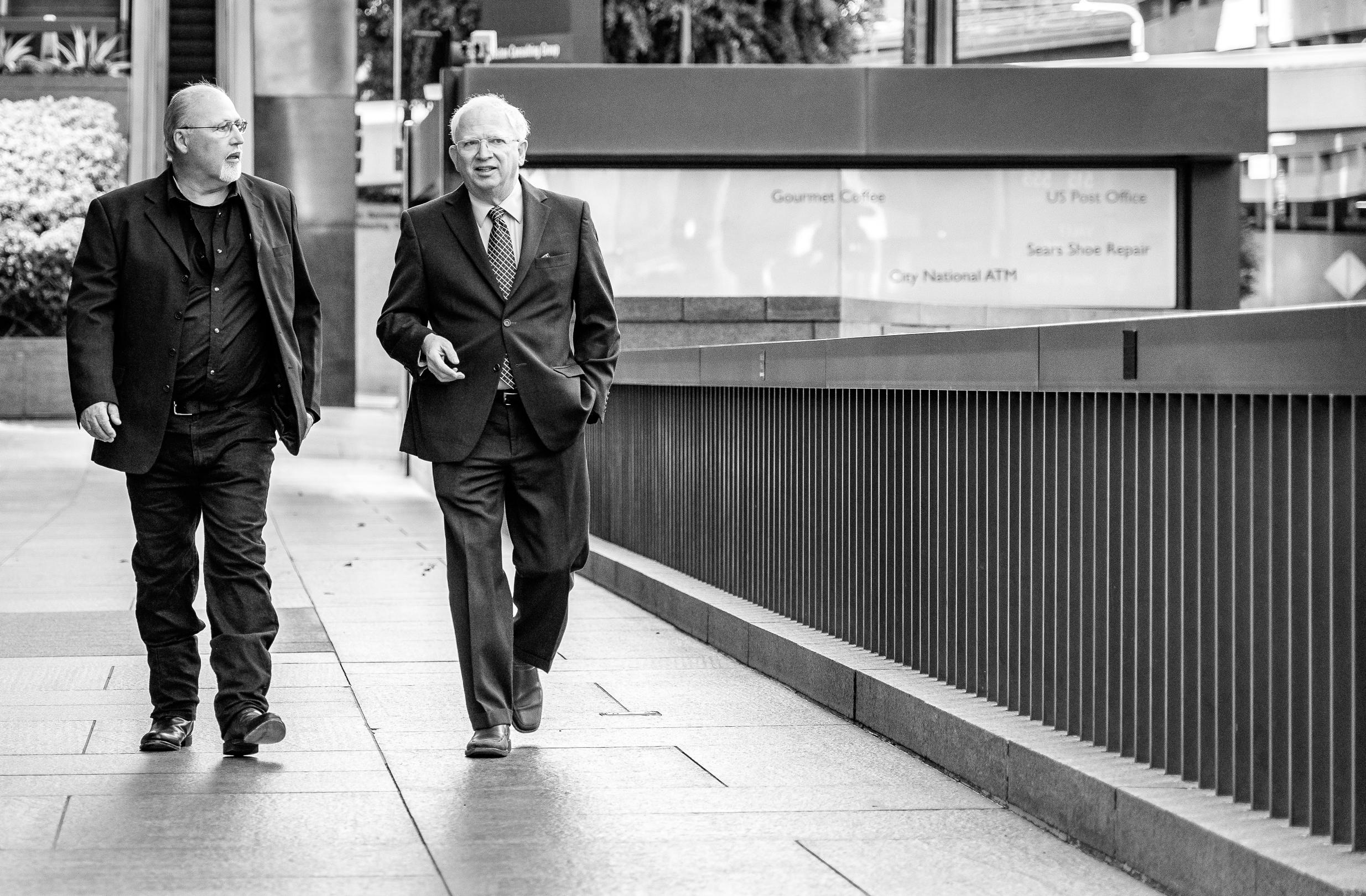
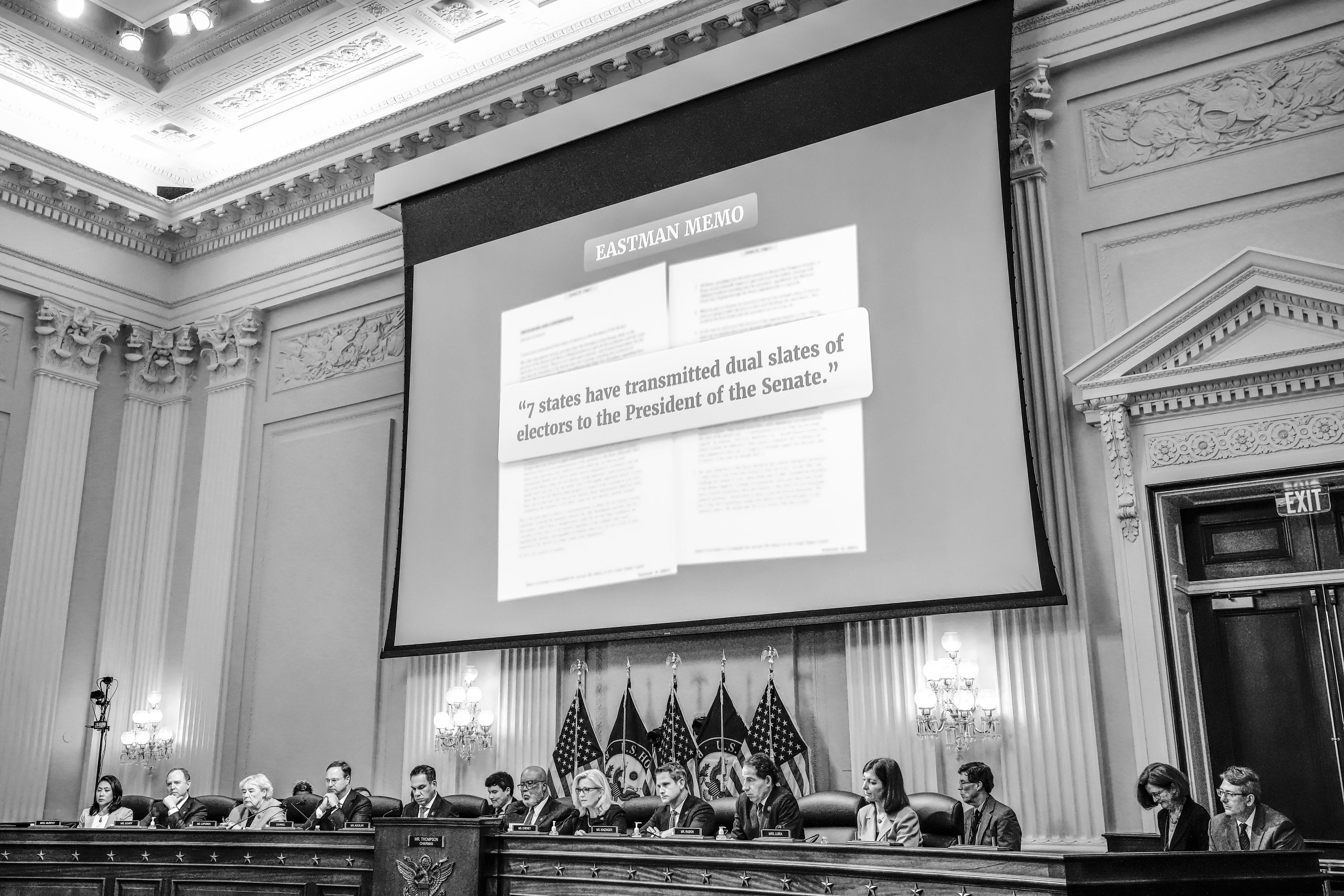
(Top) John Eastman, attorney to former President Donald Trump, in Los Angeles on April 5, 2024. (Bottom) An excerpt from a memo by Mr. Eastman is displayed during the third hearing of the House Select Committee to Investigate the January 6th Attack on the U.S. Capitol on June 16, 2022. (John Fredricks/The Epoch Times, Drew Angerer/Getty Images)
Still, when state bar associations discipline lawyers like Mr. Crowley and Mr. Eastman, they refer to rules enacted by the ABA, including 8.2.
There’s also ABA rule 8.4(g), which says a lawyer shall not “engage in conduct that the lawyer knows or reasonably should know is harassment or discrimination on the basis of race, sex, religion, national origin, ethnicity, disability, age, sexual orientation, gender identity, marital status or socioeconomic status in conduct related to the practice of law.”
This rule is not “narrowly tailored,” Ms. Tarkington said, and it covers comments that could be considered “derogatory or demeaning on a very long list of bases.”
“The problem is a number of conservative viewpoints, whether it be on abortion, or on immigration, or on traditional marriage, are things that because of the way [8.4(g) is] written, they would have a greater tendency to be problematic,” and thus elicit disciplinary actions, she said, with a “potential for greater restriction and greater discipline of conservative lawyers.”
The Epoch Times contacted the Florida Bar but didn’t receive a reply prior to publication.
Election Litigation
Some of the highest-profile disciplinary proceedings against conservative attorneys in recent years have been against the group that helped President Trump dispute the 2020 election results.
Beyond Mr. Eastman and Mr. Clark, the District of Columbia Bar Discipline Committee recommended disbarring Rudy Giuliani in July 2023, and the final decision will be made by the District of Columbia Court of Appeals.
Sidney Powell and her lawyer, Lawrence Joseph, are also facing various repercussions from advancing claims and lawsuits related to the 2020 election results. Ms. Powell was sued by voting machine companies over accusations she made that the 2020 election was rigged against President Trump and was also indicted in the Georgia RICO case along with the former president, Mr. Eastman, Mr. Clark, Mr. Giuliani, lawyer Kenneth Cheseboro, lawyer Jenna Ellis, former White House Chief of Staff Mark Meadows, and others.
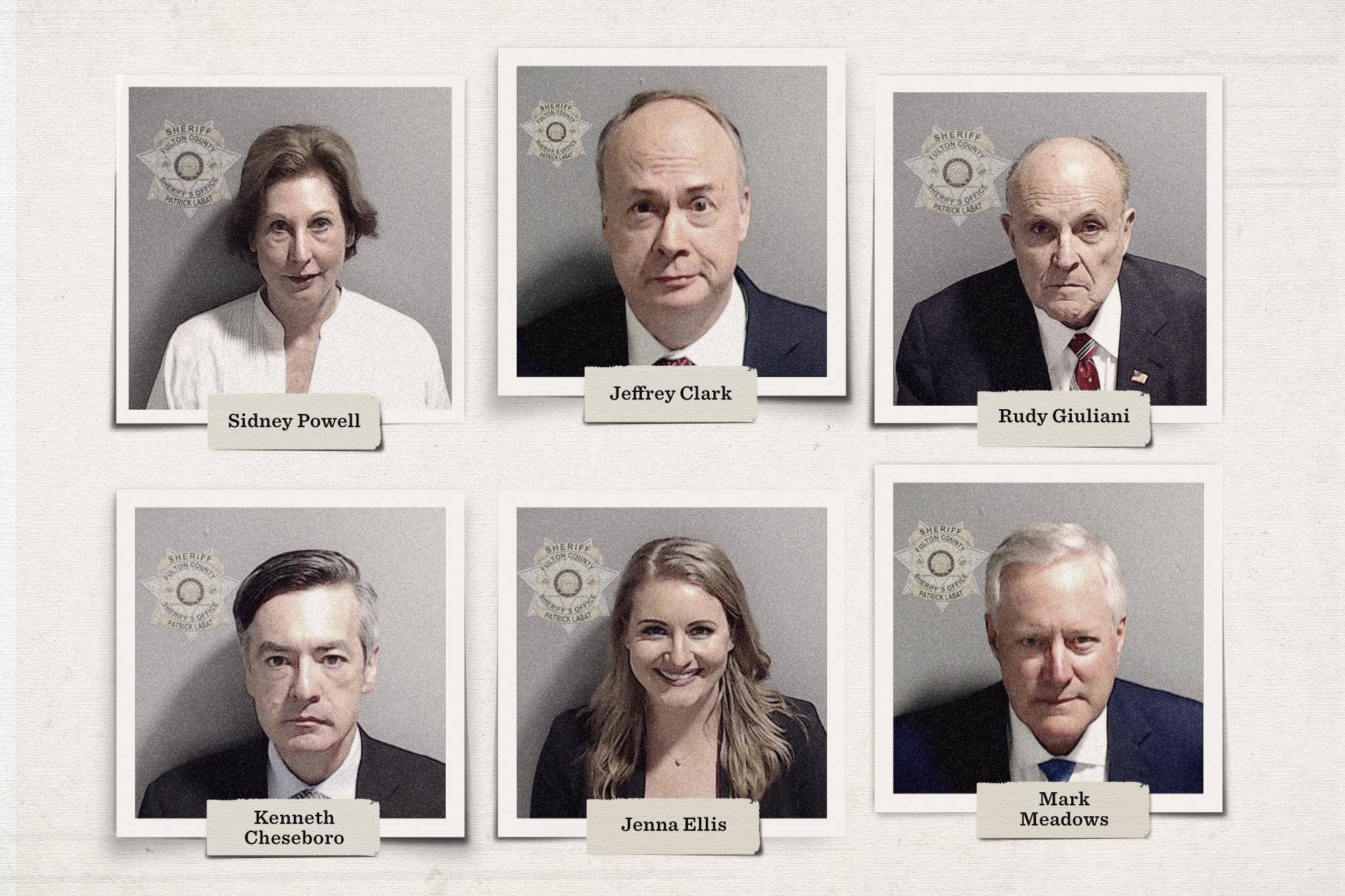
Attorneys who were charged for their efforts to challenge the 2020 election results by Fulton County District Attorney Fani Willis. (Getty Images)
Mr. Joseph, like Mr. Clark, received disciplinary charges from the District of Columbia Bar’s office of disciplinary counsel earlier this year.
The rules “need to be clarified as to the obligations for when you’re advising or assisting government,” Ms. Tarkington said.
She argued the rules used to discipline these lawyers are “really broad and amorphous” and that it’s “really hard to know in advance whether whatever you’re doing would violate them.”
While Ms. Tarkington takes issue with those who allegedly helped submit a second slate of electors, she doesn’t believe disciplinary proceedings should be brought against everyone who represented President Trump or “everyone who filed litigation on his behalf” to challenge the 2020 election results.
The former president had a First Amendment right to challenge the election in court, Ms. Tarkington said, and “his lawyers had a corresponding First Amendment right to petition on his behalf to associate with him.”
Despite this, groups like The 65 Project have gone after all of the attorneys who filed lawsuits litigating the 2020 election results, including against James Bopp Jr., who represented Michael Gableman after his investigation into Wisconsin’s election commission. Mr. Bopp received an ethics complaint after asking a judge to recuse himself, believing the judge was biased against Mr. Gabelman’s case.
Mr. Bopp, who has practiced law in Indiana for five decades, believes the group is being disingenuous by lumping together all lawyers who brought election lawsuits.
“One of the particularly despicable parts of their campaign is they’re not distinguishing between lawyers who make good faith, perfectly appropriate, under the law challenges” and those who allegedly went beyond the courts with the second slate of electors, he told The Epoch Times.
Cases are typically litigated one of two ways, Mr. Bopp said. In one, a lawyer already has the facts on hand to sue a party and, for example, seek damages after fighting the case in court.
“The other is that there is a good faith basis for believing that if you did discovery, you could find the facts,” he said. And if you don’t find the facts, he added, you dismiss the case.
Mr. Bopp said if lawyers could only litigate the first kind of cases, “What would be the point of discovery?”
“Well, they’re saying that they’re trying to discipline people because [those people] didn’t already have the facts,” he said.
“And that’s a huge problem for any lawyer,” Mr. Bopp said, regardless of their political affiliation.

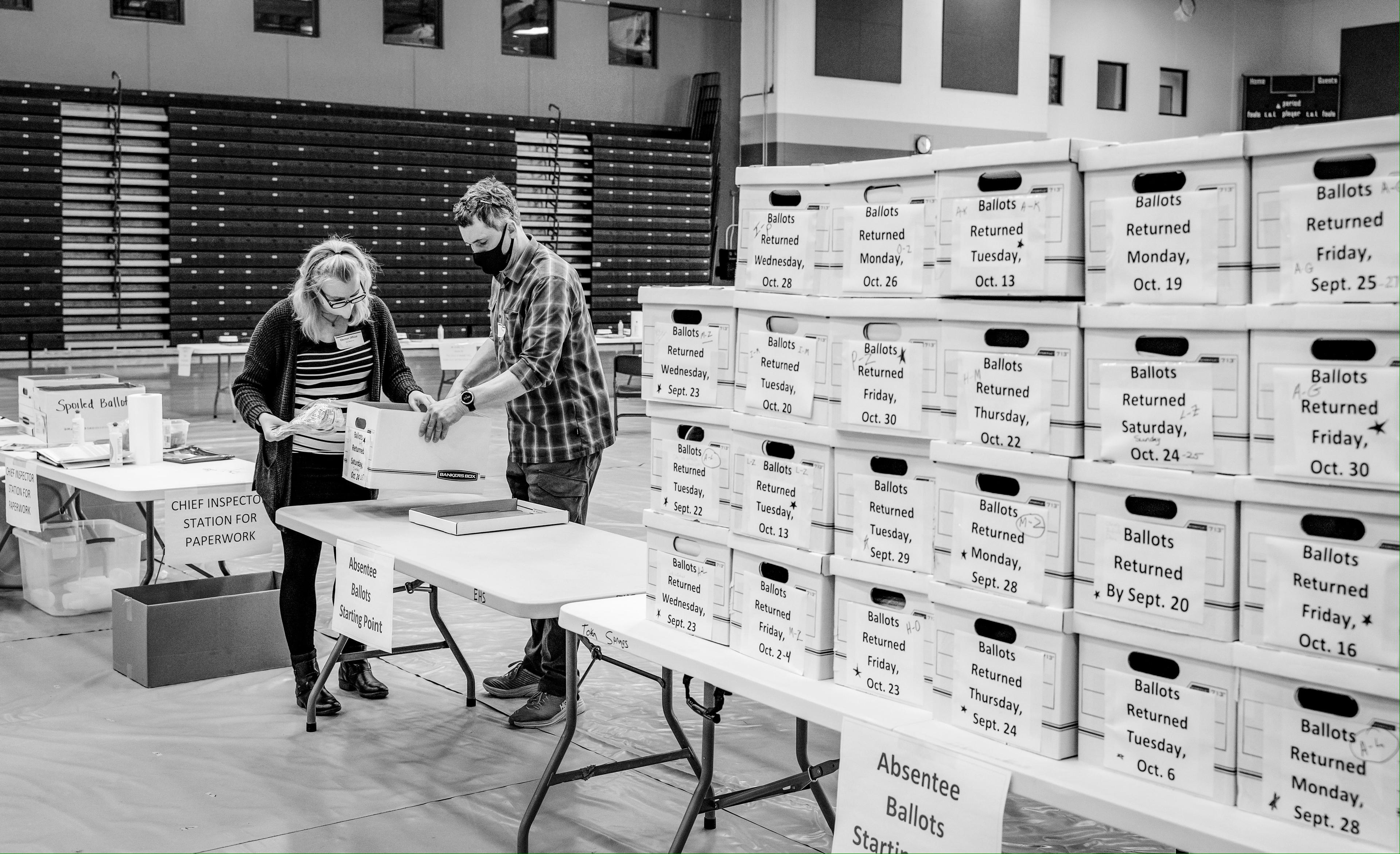
(Top) Lawyer James Bopp Jr., at the Indiana Statehouse in Indianapolis, Ind., on Feb. 21, 2024. Mr. Bopp was subject to an ethics complaint after he asked a judge to recuse himself while representing Michael Gableman in an investigation into Wisconsin’s election commission. (Bottom) Poll workers check a box of absentee ballots in Sun Prairie, Wis., on Nov. 3, 2020. (Aj Mast for The Epoch Times, Andy Manis/Getty Images)
Ms. Tarkington said she understands and appreciates what The 65 Project is trying to do, but that “you absolutely can’t just say everyone that brought this kind of litigation, or that was involved in the Trump campaign litigation, was unethical, because they weren’t.”
The Epoch Times reached out to The 65 Project for comment but didn’t receive a response prior to publication.
Conservative Attorneys Harassed
Conservative lawyers have not just encountered disciplinary actions for representing certain causes or clients; they have also experienced targeted harassment.
Mr. Parlatore spent more than a year representing President Trump in his Florida classified documents case and in the Jan. 6-related case filed in Washington, D.C. He told The Epoch Times that after speaking on cable news, he received death threats in voicemails and emails from “wackos who, just because I didn’t say what they wanted to hear, [think] that I should be killed.”
While he believes Ms. Powell “did a lot of things that she should not have done,” namely stating in court there was widespread evidence of election fraud before ordering discovery to prove those claims, Mr. Parlatore said, “I don’t agree with the general weaponization of legal proceedings to go after enemies.”
He also noted how because of lawyers being “disincentivized” from working with President Trump in the first place, his legal team was much smaller than others who have challenged an election, such as former President George W. Bush.
President Trump is not the only person who struggles to find legal counsel due to the politicization of jurisprudence. The rioters who were indicted for the Jan. 6 Capitol breach have struggled to find legal representation after major firms throughout the country declined to take their cases.
Mr. Brown has a friend who was indicted for being at the protests on Jan. 6, 2021, but never entered the building. Despite potentially having a more solid case than many of the other defendants, the lawyers at Mr. Brown’s former firm refused to take the case.
Mr. Clevenger said he has a colleague in New York who was fired from his firm simply for offering to represent a Jan. 6 defendant who was accused of participating in an assault, but video evidence “showed unequivocally that he had no role in any assault.”
“You can kiss your career goodbye, kiss your job goodbye if you try to represent a J6 defendant. There’s not a mid-sized or major firm in this country that I know of that would allow you to represent a J6 defendant,” he said.
Since Mr. Leduc operates a private law firm in Tampa, Florida, he was shielded from any threats to his job for representing Paul Hodgkins, one of the first Jan. 6 defendants to plead guilty for his part in the Capitol riots.
However, he was rebuked by the media and other lawyers for drawing allusions in his sentencing memorandum to former President Abraham Lincoln’s call for grace toward the South in his second inaugural address, just 41 days before his assassination.

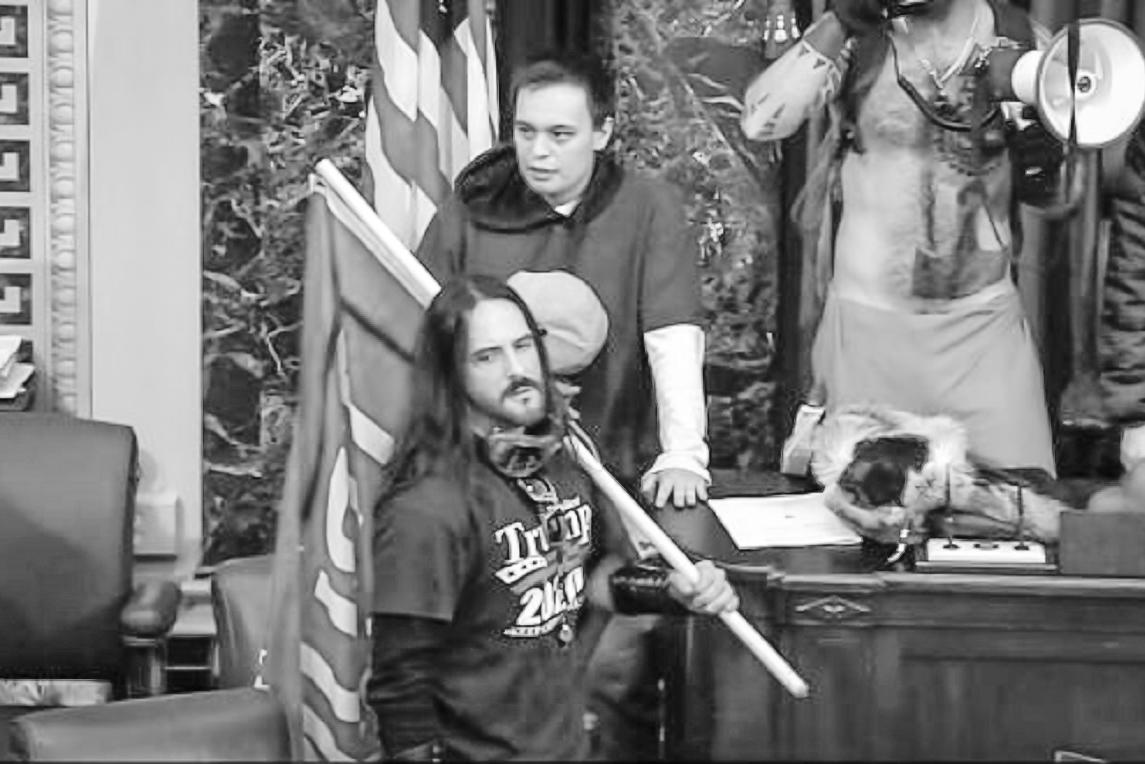
(Top) Attorney Patrick Leduc in Tampa, Fla., on Feb. 12, 2024. Mr. Leduc was harassed and criticized for representing one of the first Jan. 6 defendants, Paul Hodgkins. (Bottom) A man identified as Paul Hodgkins walks inside the Senate chamber holding a U.S. flag at the U.S. Capitol on Jan. 6, 2021. (Edward Linsmier for The Epoch Times)
“I was trying to make the point here that Lincoln saw that the way to heal a nation that had just suffered 623,000 dead over four years, was to do something remarkable, which was to give grace [and] give forgiveness,” Mr. Leduc said.
However, Mr. Leduc saw anything but “grace” in the reaction to Jan. 6, with some defendants serving multiple-year sentences for taking part in the riots. He was frustrated to see some participants in the 2020 George Floyd protests receive less punishment for taking part in riots that destroyed businesses.
After representing Mr. Hodgkins, the Tampa attorney received so much harassment in voicemails, texts, and emails that he created a mural with the clippings. In one voicemail that Mr. Leduc shared with The Epoch Times, the person in the recording calls the lawyer a “[expletive] traitor.”
He said the backlash he received is a “reflection of where we’re at as a country” where intolerance and vengeance are chosen instead of grace.
“And we live in a country today where we’re harsh, we’re ugly, we’re evil to one another. We’re unwilling to forgive” and “We’re seeking vengeance” instead of grace and healing.
This climate is feeding the political disparity in law as well, Mr. Leduc said.
Job Loss
Before working at the Parlatore Law Group with Mr. Parlatore, Mr. Brown was a lawyer focusing on commercial litigation and bankruptcy at a prominent law firm in New Jersey.
The former Navy Seal used his GI bill to attend Rutgers University, where he is the current President of Veteran Alumni.
Before Mr. Brown’s previous firm fired him for making political statements in a LinkedIn post, he says he had disagreements with the office’s Diversity, Equity, and Inclusion (DEI) Committee. First, he says he was rebuffed when asked if he could join the committee, to which they told him the committee already had a veteran on it, and then again when he noticed the firm had not sent out any emails on 9/11 to honor those who died during the attacks despite numerous emails from the DEI group honoring LGBT causes.
Mr. Brown felt he was targeted for his conservatism and says he was given assignments that most would hate, including representing child molestation defendants, despite being a bankruptcy lawyer by trade. He wondered if his managers were trying to get him to quit on his own accord rather than fire him directly.
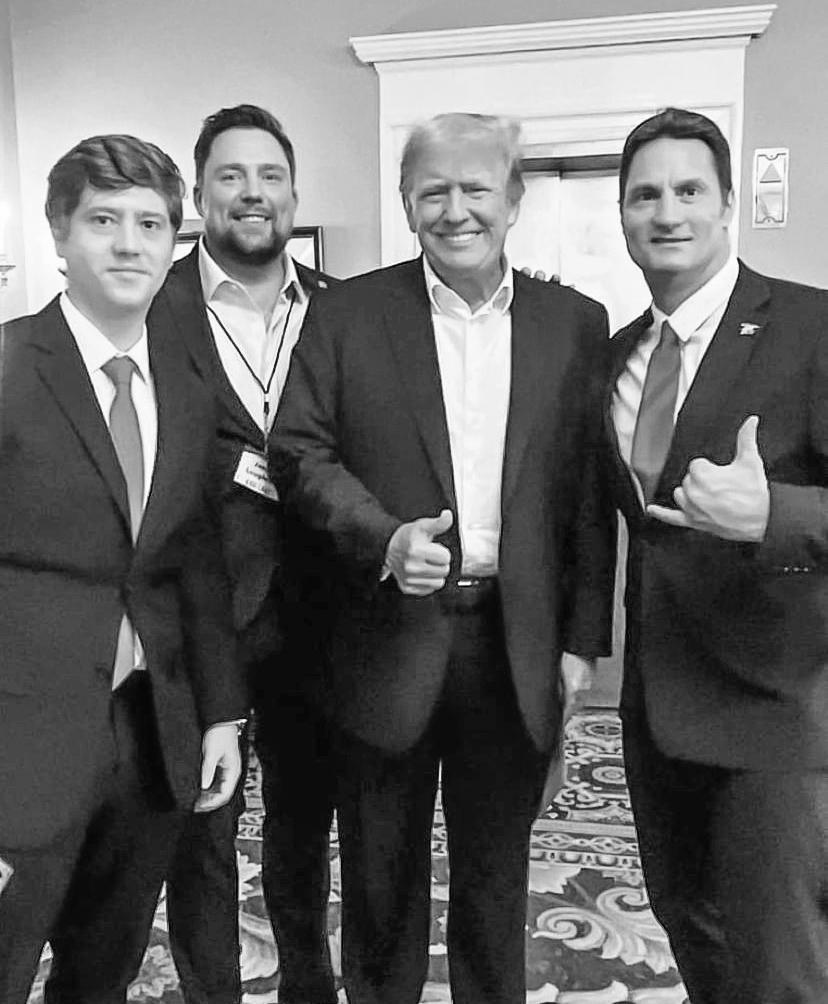
William Brown (R), an attorney at Parlatore Law Group, in Arlington, Va. (Courtesy of William Brown)
“In my opinion, that’s what they were trying to do. They didn’t want to fire me outright, I think initially because I’m a combat veteran Navy Seal,” he told The Epoch Times.
That glorification, he wrote, “had a negative influence on many young and easily impressionable American black youth” and that these negative values shared with militant sects of Islam “leads to a trap, with the real result being a great loss of not even beginning to maximize one’s personal growth potential.”
Mr. Brown is critical of militant Islam after being a first responder to two separate suicide bombings in Iraq, including one of an American cafe in Baghdad’s Green Zone that left many injured and dead.
“It was a really bad picture; people all ripped apart, body parts, people screaming, dead. Just seeing that” was horrifying, Mr. Brown said.
He says his firm fired him for the post, saying it “promoted negative stereotypes of blacks and Muslims.”
“You know what that is really? They’re basically stating that I was a racist,” Mr. Brown said. “That’s a death sentence in a legal community. Chances are, I will never get a job at another big law firm in the state of New Jersey.”
He said he rejected their severance package because he didn’t want to be forced to sign a non-disclosure agreement (NDA) and not speak out about what happened to him.
“No way. I said no. Because it’s important that I think the American people see what’s happening within big law and within American jurisprudence,” Mr. Brown said.
Law Leans Left
Even before the ethics complaints flowed after the 2020 election, many lawyers saw their profession leaning farther to the left than to the right.
Neama Rahmani, a former federal prosecutor, told The Epoch Times that “there’s no question that the legal industry, especially law schools, tend to lean liberal.”
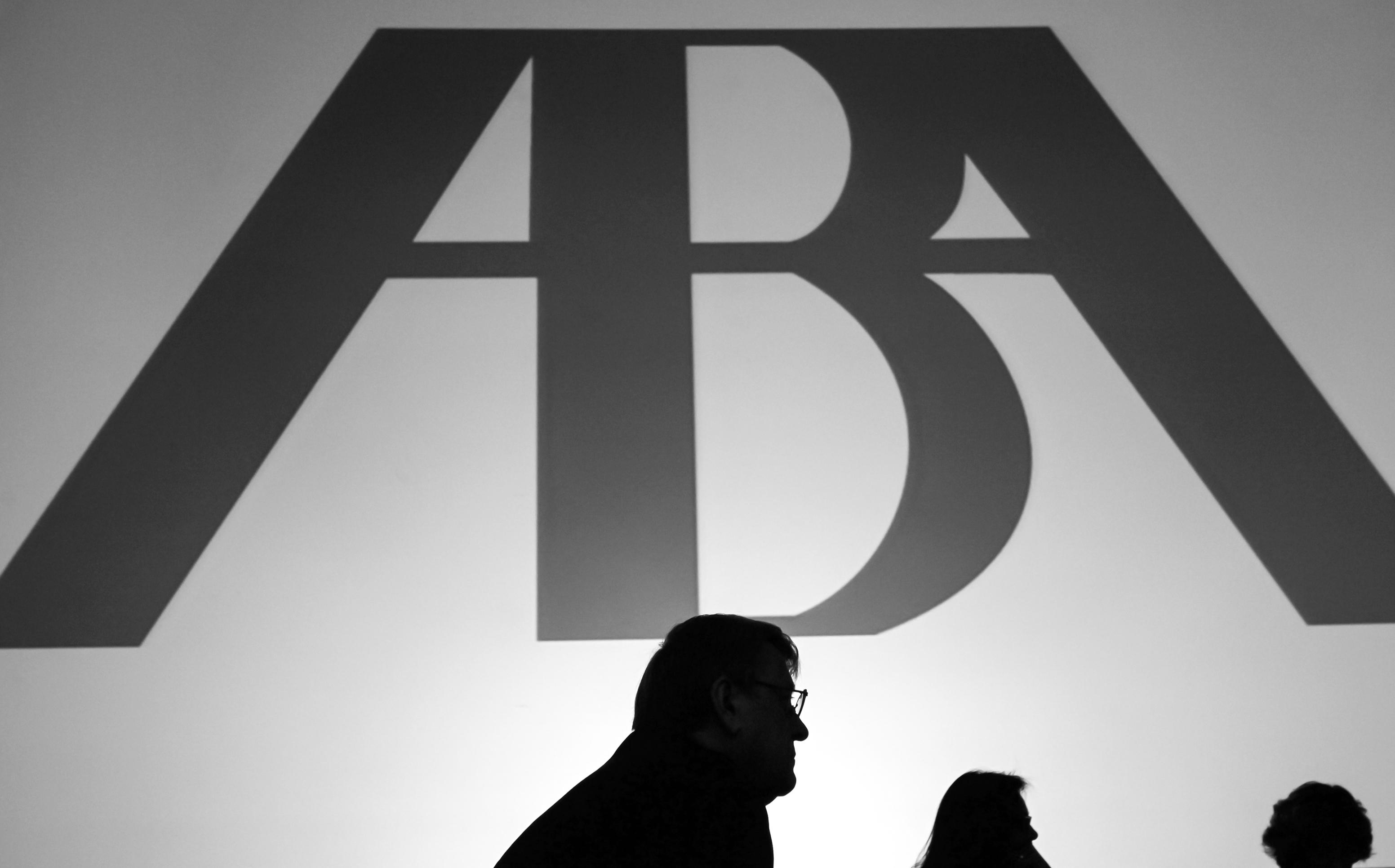
Two models rules from the American Bar Association have the potential to disproportionately affect conservative attorneys, according to law professor Margaret Tarkington. (Justin Sullivan/Getty Images)
“This is something across all universities, and law is no different,” he said.
The trend goes back further than the last decade. The authors cited a 1998 study that analyzed “entry-level hires from 1986 to 1991” and found that the self-reported political beliefs of law professors skewed 75 percent liberal and just 10 percent conservative, indicating a historical left-wing bias in the legal academy.
This bias apparently also extends to the ABA, which Mr. Rahmani said “tends to be pretty liberal.”
Mr. Malcolm, in agreement, said the organized bar associations have long been “dominated by liberals.”
Mr. Rahmani noted there might be “certain jurisdictions and pockets of conservatism” in the legal profession, possibly more common in conservative-leaning states, but that in more than 20 years of practicing law, he has seen a profession that is “predominately liberal.”
This also extends to “top-tier law firms,” Mr. Malcolm said.
Not all lawyers agree. Ms. Tarkington, a law professor, is not a believer in a systemic politicization of the legal profession and said judges try “very hard to be impartial.”
However, she noted that model rules, such as the ABA’s 8.2 regarding attorney speech, have the potential to be used politically or unfairly by state bar associations.
“Lawyers are effectively gagged from commenting on what judges do, and that is terribly problematic, and that does need to be changed,” she said.
Mr. Parlatore warned that the politicization of law could have reverberating effects. He said it would be a “dangerous situation for justice” if only conservative attorneys could represent conservatives and conservative causes, and only liberal attorneys could represent those same figures and pursuits on the left.
“That’s awful,” he told The Epoch Times. “There shouldn’t be politics in the courtroom, period. On either side.”
Original News Source Link – Epoch Times
Running For Office? Conservative Campaign Consulting – Election Day Strategies!

